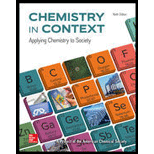
(a)
Interpretation:
The example for each of the four given R and the plastic involved in it has to be determined.
Concept Introduction:
Monomer: A molecule is considered as monomer when this molecule bonds with another identical molecule which results to form polymer.
(b)
Interpretation:
The example that depicts the link between public health and waste reduction has to be indicated.
Concept Introduction:
Polymers: Monomers combine together to form polymers. Monomers are the repeating units of small molecules which link together to form polymers and the process is called as polymerization. Polymers are macromolecules which are formed a by number of repeating units called monomers.
Monomer: A molecule is considered as monomer when this molecule bonds with another identical molecule which results to form polymer.
Want to see the full answer?
Check out a sample textbook solution
Chapter 9 Solutions
Chemistry In Context
- Use the web to research the amount of PVC polymer produced annually in the United States. What are the three most common uses of this polymer?arrow_forwardWhat are the alternatives to single-use plastics? Consider their viability from both an economic and scientific perspective.arrow_forwardGlass and plastic are the two most commonly used packaging materials in the pharmaceutical industries. In your opinion which one is better and why?arrow_forward
- An example of a product made from a synthetic material is A. a pine 2×4 board © B. a PET plastic water bottle. C. knitted wool socks D. a cotton t-shirt.arrow_forwardIn four or more sentences, explain the advantages of using biodegradable plastic.arrow_forwardThe 'world's Ethics and quality-assurance committee' makes sure that liquor-alcohol should be made in the industry from what raw material? a. plants b. petroleum c. natural laboratory d. animals *Choose only one answer and explain.arrow_forward
- What is the chemists’ solution to non-biodegrable plastics?arrow_forwarda) What is the chemicals in plastic and what are the physical and chemical properties of it.arrow_forwardWhat biodegradable and non-biodegradable materials can we reuse/recycle from our environment? Explain in 3 paragraphs.arrow_forward
 Chemistry: The Molecular ScienceChemistryISBN:9781285199047Author:John W. Moore, Conrad L. StanitskiPublisher:Cengage Learning
Chemistry: The Molecular ScienceChemistryISBN:9781285199047Author:John W. Moore, Conrad L. StanitskiPublisher:Cengage Learning
 Chemistry for Engineering StudentsChemistryISBN:9781285199023Author:Lawrence S. Brown, Tom HolmePublisher:Cengage Learning
Chemistry for Engineering StudentsChemistryISBN:9781285199023Author:Lawrence S. Brown, Tom HolmePublisher:Cengage Learning Chemistry & Chemical ReactivityChemistryISBN:9781337399074Author:John C. Kotz, Paul M. Treichel, John Townsend, David TreichelPublisher:Cengage Learning
Chemistry & Chemical ReactivityChemistryISBN:9781337399074Author:John C. Kotz, Paul M. Treichel, John Townsend, David TreichelPublisher:Cengage Learning Chemistry & Chemical ReactivityChemistryISBN:9781133949640Author:John C. Kotz, Paul M. Treichel, John Townsend, David TreichelPublisher:Cengage Learning
Chemistry & Chemical ReactivityChemistryISBN:9781133949640Author:John C. Kotz, Paul M. Treichel, John Townsend, David TreichelPublisher:Cengage Learning Chemistry for Today: General, Organic, and Bioche...ChemistryISBN:9781305960060Author:Spencer L. Seager, Michael R. Slabaugh, Maren S. HansenPublisher:Cengage Learning
Chemistry for Today: General, Organic, and Bioche...ChemistryISBN:9781305960060Author:Spencer L. Seager, Michael R. Slabaugh, Maren S. HansenPublisher:Cengage Learning





